- Project Finance
- Sustainable Investing & ESG
- Tax Incentives & Appropriations
- Transmission & Power Markets
- Workforce
- Blog
Recap of ACORE’s First-Ever Virtual REFF-Wall Street
By: Maheen Ahmad and Adam Carey
September 23, 2020
REFF-Wall Street is America’s premier renewable finance event. This year, with the well-being of attendees, partners and staff as the number one priority, the industry gathered on September 9 and 10 for a first-ever virtual experience. The event, hosted by the American Council on Renewable Energy (ACORE) and IJ Global, featured live and on-demand content available through an innovative digital platform (pictured below).
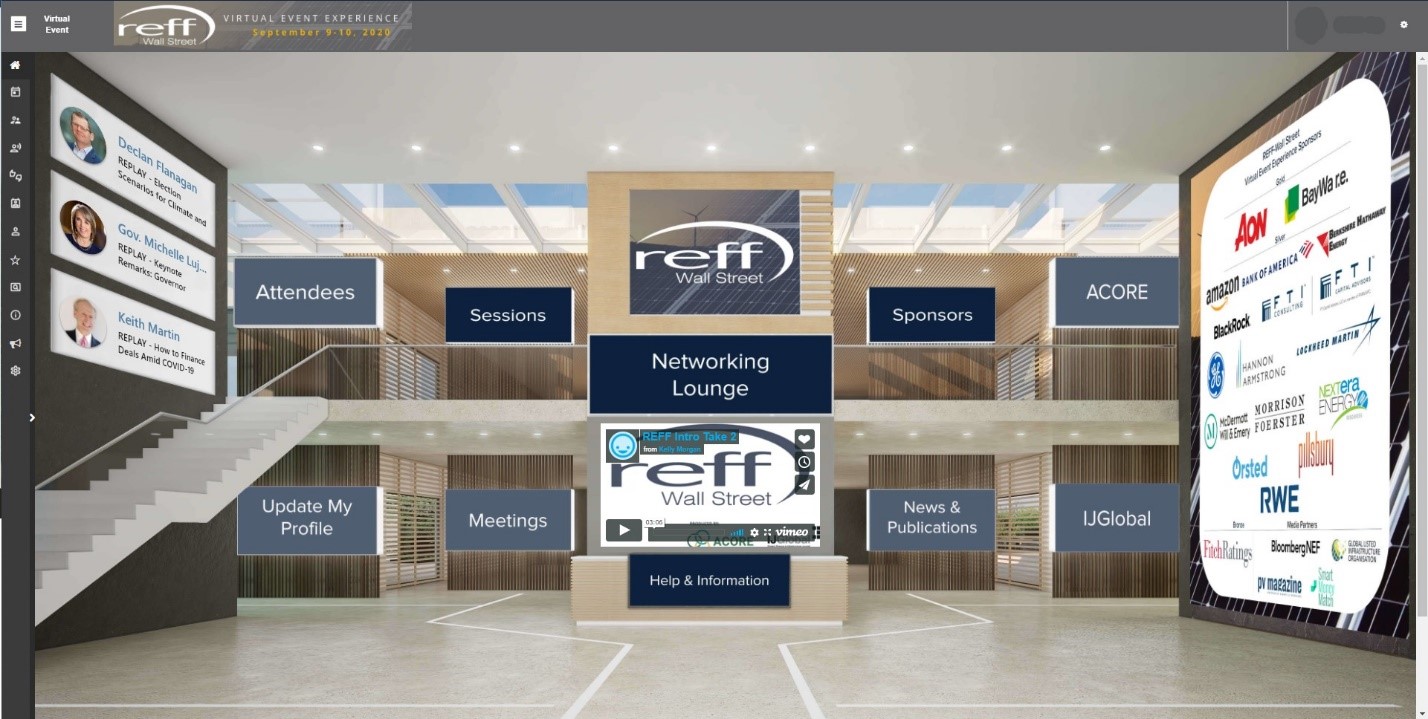 In the virtual REFF-Wall Street conference hub, attendees were able to socialize during networking breaks, set up one-on-one meetings, visit exhibition booths and of course watch the conference proceedings. Hundreds of attendees tuned in to both days of REFF Wall Street 2020. Read on for a quick review of highlights.
In the virtual REFF-Wall Street conference hub, attendees were able to socialize during networking breaks, set up one-on-one meetings, visit exhibition booths and of course watch the conference proceedings. Hundreds of attendees tuned in to both days of REFF Wall Street 2020. Read on for a quick review of highlights.
9:00 – 9:15 AM – Welcome

To start the day off, ACORE’s Greg Wetstone introduced Declan Flanagan, Chair of the ACORE Board and Executive Vice President and CEO of Ørsted Onshore. The two greeted virtual attendees, thanked the many sponsors of REFF-Wall Street 2020, and provided a short snapshot of the renewable energy industry. As Flanagan put it, the fact that “the transition [to a renewable energy economy] continues at pace even during COVID is a testament to the resilience of our industry.”
9:15 – 10:00 AM – Election Scenarios for Climate and Energy Policy
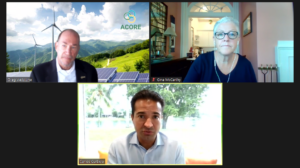
For the first panel of the day, ACORE’s Greg Wetstone was joined by NRDC’s President and CEO Gina McCarthy and former U.S. Representative Carlos Curbelo to consider election scenarios for climate, energy and COVID-19 relief policies. The group discussed the current Administration’s renewable energy record, and expectations for a Biden Administration in contrast to another term for President Trump. The lively conversation included a recognition of the surprisingly high level of bipartisan support for renewables, and what needs to be done to encourage Republicans to, as Curbelo noted, “take a leap of faith and do the right thing” in supporting aggressive renewable energy legislation. In a poignant call to all renewable energy supporters, McCarthy said, “We need to look at stimulus spending to bring clean energy to the fore in everything we do. We have an opportunity to rebuild our future in a way we can hand to our children.”
10:30 – 11:00 AM – Keynote Remarks: Governor Michelle Lujan Grisham, New Mexico
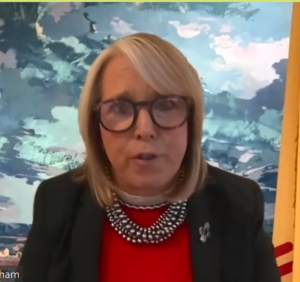
In the first keynote address of the day, Governor Michelle Lujan Grisham spoke about the ambitious efforts underway in New Mexico to integrate renewable energy into the grid, including the state’s commitment to be 100% carbon neutral by 2045. Noting extensive state partnerships, including transmission investments with ACORE Board Member Pattern Energy, the Governor proclaimed that the state will be a leader in the transition to renewable energy with or without federal support. According to the Governor, multi-stakeholder, bipartisan coalitions are key to facilitating the transition to a renewable energy economy. “Bring everyone together,” Lujan Grisham said. “Take these groups and embed them in every state to set the stage for statutory changes that will move mountains.”
11:00 AM – 12:00 PM – How to Finance Deals Amid COVID-19
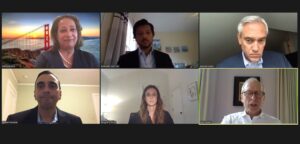
Some of the nation’s most prominent renewable energy investors and developers assembled for the second panel on financing deals amid COVID-19. Despite tax equity constraints, each of the panelists reported continued deals and project commitments. Marshal Salant, Global Head of Alternative Energy Finance at Citi, shared that the number of deals made this summer was “better than a normal year.” Similarly, Mit Buchanan, Managing Director at J.P. Morgan, confirmed that her institution has already moved forward on renewable deals for 2021. Jordan Newman, Managing Director of Wells Fargo, noted that while they were still in the tax equity market, the bank was being “more selective than before with solar ITC deals due to reduced tax capacity.” Invenergy’s Senior Vice President of Finance and Capital Markets Meghan Schultz reported that the power generation development and operations company has not yet signed new project deals for 2021 due to uncertain tax equity availability but has been able to raise $1.8 billion in debt financing for projects.
According to the panelists, while some projects have had to be pushed to 2021, most of their project delays have been minor. Bernardo Goarmon, Chief Financial Officer of EDP Renewables North America, shared that the company has been able to secure project deals for 2021 as planned. In general, investors and developers report readily available debt financing despite COVID-19.
1:30 – 2:00 PM – Keynote Remarks: Neil Chatterjee, FERC Chairman
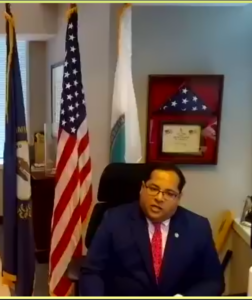
In a passionate keynote address, FERC Chairman Neil Chatterjee highlighted the power grid’s ability to continue to reliably deliver electricity during the pandemic, and emphasized the importance of well-functioning, competitive electricity markets during times of uncertainty. When asked about recent FERC orders, the Chairman replied, “It really does frustrate me when people look at our actions to preserve markets as being hostile to any particular fuel source.” An amiable debate about FERC’s minimum offer price rules ensued in which ACORE’s Greg Wetstone commented that “renewables have to be able to take advantage of their cost-effectiveness to compete directly” and noted that renewables are not the only generation resources receiving government support. The Chairman observed that zero-emissions resources have become cost-competitive partly due to shifting consumer preferences. Chairman Chatterjee also pointed out the importance of a resilient transmission system, citing an American Society of Civil Engineers study that reports $130 billion is needed for investment in transmission and distribution. Chairman Chatterjee also broke news of an imminent order on aggregated distributed energy resource (DER) integration, which was ultimately issued on September 17, 2020.
2:00 – 3:00 PM – The Role of Sustainable Finance in COVID-19 Recovery and Investing in the Carbon Economy Transition

While digging deep into the role of Environmental, Social and Governance (ESG) funds and reporting in today’s financial landscape, this panel of sustainability-minded investors and executives discussed the “trifecta of COVID, the long-overdue focus on racial equity, and the necessary discussion on climate” as the main drivers for change in the current large-scale reshaping of finance. The panel covered how investors in 2020 are prioritizing their genuine concerns through sustainable investing and carbon accounting, and their awareness of the need for financial institutions to provide credible reporting on the success of these new future-focused funds.
4:00 – 4:45 PM – Corporate Offtake Agreements: Designing Strategies for Risk Reduction
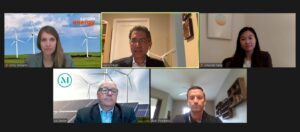
In a discussion led by Ed Zaelke of McDermott Will & Emery, the panelists explored how offtake arrangements are shifting away from traditional structures and increasing in complexity as corporate buyers comprise a larger share of renewable demand. Facebook’s Amanda Yang reported continued progress on the company’s renewable energy goals despite COVID-19. Harry Singh of Goldman Sachs noted his observations on how Renewable Energy Credits (RECs) pricing has increased this year compared to the last several years. Emily Williams from Edison Energy cited increased interest in renewable energy commitments, with buyers growing more interested in community impacts and engagement with environmental justice movements in addition to the price of PPAs. Rob Threlkeld of General Motors (GM) mentioned that when GM is now making its agreements, the company poses the question: “How do we think about fleet electrification as an enabler to additional renewables to the grid” in a way that benefits the broader decarbonization effort?
4:45 – 5:30 PM – Diversity, Equity & Inclusion in the Renewable Sector

The last discussion of REFF-Wall Street 2020 Day 1 featured AABE’s Paula Glover and WRISE’s Kristen Graf discussing what equity looks like for the renewable energy sector in 2020. The duo shared recommendations on how individual organizations can make inclusive changes in hiring and mentorship practices to enhance the diversity of the industry at large. Key first steps include: acknowledging a lack of existing diversity in your organization, attending and maintaining a presence at renewable-based events geared toward underrepresented groups, and reaching out to universities’ existing networks of underrepresented students with job opportunities. With these steps, Glover and Graf suggested that organizations can begin to make a lasting change to the makeup of the industry.
Day 2
9:00 – 9:45 AM – Global Markets: Transborder Investment in a Locked-Down World
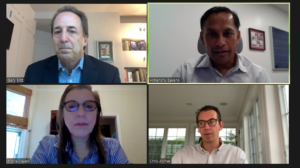
The first panelists for REFF-Wall Street Day 2 explored the evolving dynamics of international investment and development during the pandemic. The panelists discussed how sellers are evaluating buyers for regulatory risk associated with recent initiatives from the Trump administration, such as the Bulk-Power System Executive Order. Panelists noted the increased presence of European investors in the United States, particularly in offshore wind infrastructure. They explained that other areas of increasing interest to international investors include the U.S. solar market and distributed energy industries.
10:30 – 11:00 AM – Keynote Remarks: Governor Ralph Northam, Virginia
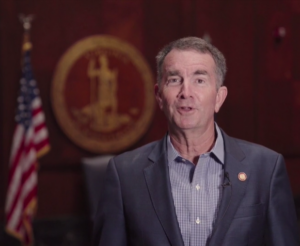
Governor Ralph Northam addressed attendees in the first keynote remarks of the day with a message on how and why clean energy growth is a current priority in Virginia. “We know renewable energy businesses will play an important role in the economic recovery of our Commonwealth and our country,” Northam said. The Governor mentioned the game-changing potential of renewable energy technology and energy storage. He noted that, though COVID-19 has changed nearly every aspect of the economy, “There is no industry with more momentum in Virginia than the clean energy industry.”
11:00 AM – 12:00 PM – C-Suite Perspectives on Business Certainty in 2021 and Beyond
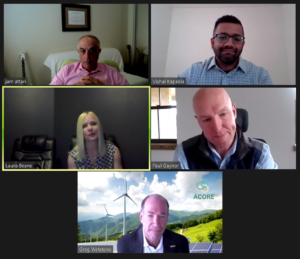
ACORE President and CEO Greg Wetstone welcomed viewers back by reading an inspiring message from President Barack Obama to conference attendees. In his letter, President Obama wrote that: “Few areas hold as much promise for our daily lives, our economy, and our planet, as renewable energy.”
The President’s remarks were followed by an insightful discussion with renewable energy leaders on their business experiences this past year. Despite pandemic-related uncertainties, C-Suite executives from
BayWa r.e., Ørsted, ENGIE North America, and Longroad Energy said that their projects are largely proceeding according to schedule, although recent regulatory barriers have created some roadblocks. They noted that the PJM MOPR has introduced considerable uncertainty when it comes to planning future projects in the nation’s largest electricity market, while tariffs imposed on technology inputs have affected revenue and prevented PPA contracts from being signed. BayWa r.e.’s Jam Attari said, “I have to hand it to our sector, the amount of entrepreneurship that has gone on to navigate these challenges is amazing.”
1:15 – 1:45 PM – Keynote Remarks: Thomas Friedman, Pulitzer Prize winner, New York Times Columnist and Author
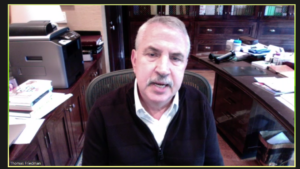
Thomas Friedman gave a sweeping picture of renewables as they fit into the world economy during the second keynote of Day 2. Friedman recognized the superior performance of the renewable energy industry over fossil fuels during the COVID-19 crisis and expounded on how the pandemic provides an opportunity to accelerate the transition to a renewable energy-based economic system. He also acknowledged ACORE’s role in leveraging the market economy to catalyze this transition. He commented that tax equity banks should “follow the ACORE agenda, not the Exxon agenda” and that American companies should lead in technological innovation. “Green is the new red, white and blue,” Friedman exclaimed.
1:45 – 2:30 PM – Debt Finance: Monetizing Merchant Revenues
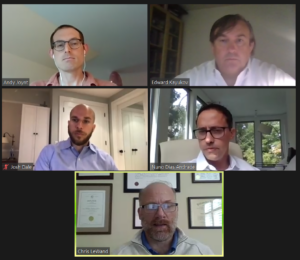
This panel of lenders reflected on how the market has evolved since the COVID-19 pandemic began in March. A big takeaway from the session was the resilience of energy projects across the sector. The panel covered the impact COVID-19 has had on the availability of bank loans and project bonds, the opportunities to leverage debt for project finance, as well as what lenders are taking into consideration regarding the opening of senior debt markets to monetize merchant project revenues. Panelists reported a rebound in debt markets to almost pre-COVID levels, with the safe harbor extension granted earlier this year helping mitigate the impact of construction delays. Edward Kayukov from Wilson Sonsini Goodrich & Rosati explained that, aside from lenders signing deals with shorter tenures of five to seven years, financing structures for utility-scale projects have been largely unchanged. Panelists also reported resilient portfolios that have not been dented by increased risks due to the pandemic. Nuno Dias Andrade, Managing Director of Santander Bank N.A., commented that this resilience is partly due to renewables being seen as a “safe haven” during the pandemic. Lenders are resizing loans to higher coverage ratios and utilizing cash sweeps to minimize risks for merchant projects. Supplemental reserves can also improve ratings by lenders.
3:30 – 4:30 PM – Consolidation and the New Recession: How Will Companies Emerge from the Crisis?

In the final session of Day 2, panelists from Bank of America, CohnReznick Capital, Onyx Renewable Partners, Capital Dynamics and CleanCapital addressed how the pandemic will affect the ongoing sector trend toward consolidation. Speakers explained that deal making has not slowed down during the pandemic, although access to third parties and maintaining the camaraderie previously made possible through in-person interactions has been a challenge. Deals have decreased for smaller projects, and the panelists pointed out that they are now seeing shorter offtake agreements due to risk considerations.
4:30 – 4:35 PM – Closing Remarks
In the final minutes of REFF-Wall Street 2020, ACORE’s Greg Wetstone thanked our event sponsors, expert panelists and keynote speakers, and underscored a recurring theme from this year’s Forum: the unwavering resilience of the renewable sector in a year of extraordinary challenge.
On behalf of the ACORE and IJ Global teams, thank you to all who were able to attend ACORE’s first-ever virtual REFF-Wall Street. Those who registered for the two-day Forum but didn’t get a chance to attend on September 9-10 can watch the program on our conference hub until October 10. Those who missed the chance to register for REFF-Wall Street and would like to access the content can reach out to events@acore.org to inquire about purchasing a post-event pass.
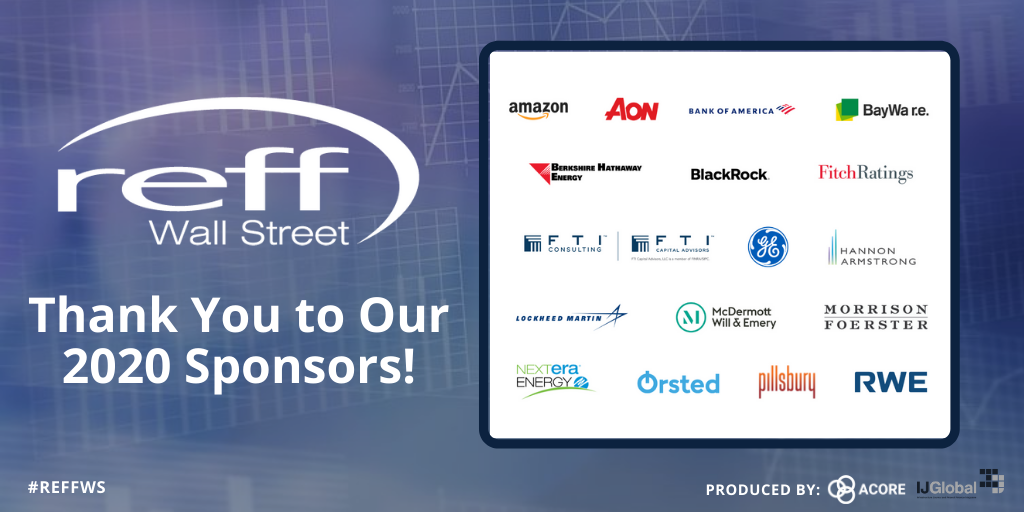
Join leaders from across the renewable energy sector.

What will our next 20 years look like? Here’s the truth: they’ll be better with ACORE at the forefront of energy policy.
Shannon Kellogg
Amazon Web Services (AWS)
